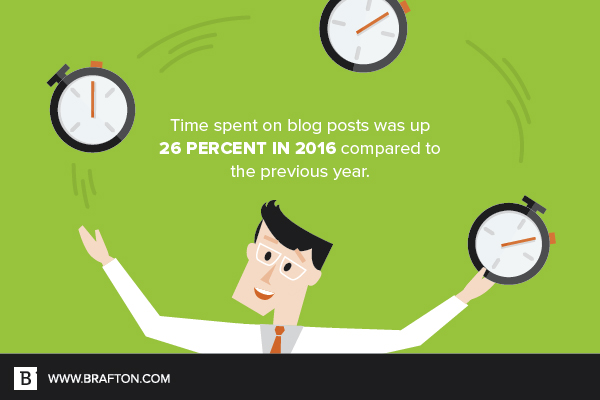Quality has become a buzzword in the content marketing industry.
With black hat SEO fallen by the wayside and search engines doubling down on user intent, more businesses than ever are asking themselves how to produce high-quality content.
Marketers know a content strategy that focuses on value and relevance is essential to differentiating themselves from the competition and establishing trust with website visitors.
But is length and time really all it takes to do so?

The trend toward longer, time-intensive content
As we’ve touched on before, professional bloggers are reporting a greater focus on length and time.
The average blog post in 2016 was approximately 1,050 words – a 19 percent increase from 2015. And the number of blog posts that are only 500 words or less is now half of what it was in 2014.
Meanwhile, the average blog post took three hours and 16 minutes to write last year, a 26 percent increase from 2015. While the number of bloggers who spend six hours or more on a piece of content has doubled, only one-third of bloggers spend less than two hours on a post.
Survey responses indicate positive results in both the case of more lengthy blog posts and content that requires more time to write.
However, it’s important not to confuse correlation with causation. Length and time do not automatically translate to quality.
“The simple fact of the matter is a single powerful sentence that conveys a strong message backed up by something to support that assertion is higher-quality writing than a dense paragraph you can read 100 times and still never understand,” said Brafton Project Manager Eric Rubino. “That said, the more words you allocate to a blog post, the more in-depth you can get, which can result in a high-quality piece of shareable content.”
As far as time is concerned, it must be time well spent.
“It’s hard to say a blog post should take so many hours to write,” Eric continued. “How long is the blog post? Are you shooting from the hip or conducting research to build an argument? Have you already identified your audience and chosen keywords? You must consider all of those factors when addressing how long it should take to write a blog post.”

What makes for high-quality content marketing?
When it comes to the essence of a quality content strategy, there are multiple elements to consider. For instance, providing expert knowledge and actionable advice is essential to demonstrating thought leadership. Additionally, focusing on storytelling helps content marketing maximize emotional impact.
However, the single most important factor is arguably whatever search engines say it is. While not all content relies on high rankings on search engine results pages to be effective, search engine optimization is vital enough to any content strategy to take the lead.
Meeting these criteria doesn’t have to be a mystery. Search engines like Google have outlined them for you.
In describing the characteristics of a high-quality web page, Google included:
- High level of expertise, authoritativeness and trustworthiness.
- Adequate amount of high-quality content.
- Sufficient website information, including who is responsible for it.
- Satisfying customer service information for websites focused on shopping and other financial transactions.
- Positive website reputation for whomever is responsible for the content.
While amount of content is touched on, Google opts for what’s appropriate based on topic and purpose over arbitrary length requirements.
In short, more time spent on longer pieces can definitely improve content marketing quality, but only if the information shared is trustworthy and valuable to website visitors.
Make every word count
While longer content that requires greater time investment may help you achieve quality, chances are you’re always racing against the clock. The old adage that time is money is as true in our modern digital world as it was in the past, if not more so.
“Spend time conducting research, primarily identifying what’s being shared already and why.”
Fortunately, there are ways to ensure content marketing quality while also saving time. Something as simple as outlining content beforehand can make all the difference.
“[Outlining] helps you nail the format and storytelling aspects, identify where supporting data and evidence is required and ensures you don’t deviate from your main message,” Eric said. “Also, get good at conducting research. Strong Googling skills can shave hours off in-depth research time.”
Keep in mind the power of uniqueness as well. If you find you do not have the time to craft a longer piece of content, concentrate on attacking a topic from a new angle. Enhancing a discussion is much more preferable than simply adding your voice to the chorus
“Spend time conducting research, primarily identifying what’s being shared already and why,” Eric said. “This ensures your content stands out from the rest.”
Don’t get bogged down in how long it takes you to produce content marketing, or whether your content strategy has enough long-form assets. Quality is a matter of packing maximum punch, regardless of length or time spent.





